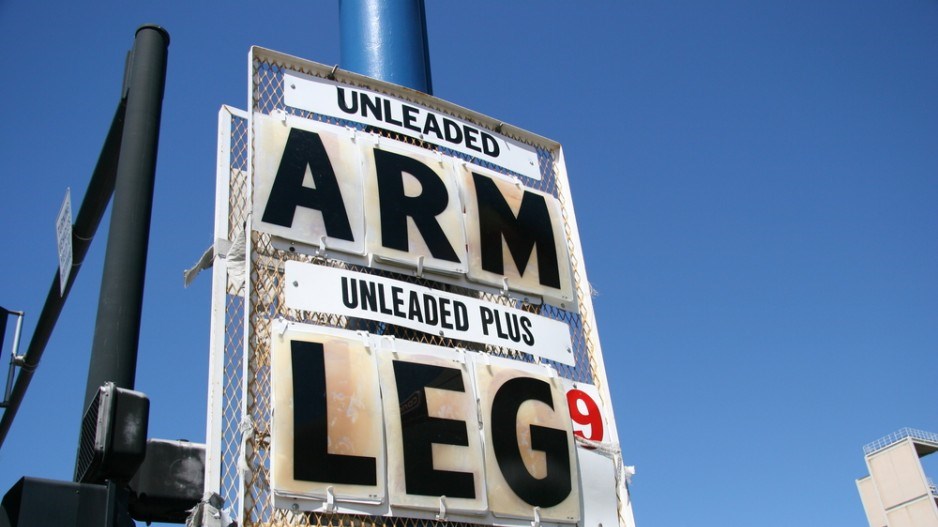While this spring’s record-high gas prices may have receded from their peak in late April, the volatility of the cost of filling up may have already done its damage in terms of affecting Vancouverites’ summer travel and long-term financial planning.
That’s the finding of a survey conducted by Coast Capital Savings based on the phone responses of 401 Metro Vancouver residents between June 5 and June 13. The report found that 63% of the respondents said high gas prices have affected their day-to-day finances.
But what’s even more worrisome, said Coast Capital’s director of wealth management business solutions, Tyler Saito, is that the poll also shows people altering their long-term financial planning by putting off paying down debt and saving because of the short-term pain at the pumps.
“We are not incredibly surprised that the rise in one budget line would cause people to react in another budget line,” Saito said. “What is surprising is where that impact is being felt, particularly when people are talking about not being able to save money or potentially not being able to pay down consumer debts…. Where that’s concerning for us is that both savings and debt are long-term financial metrics. It will impact you 10, 15 years down the road, whereas gas prices are a short-term increase to your budget.”
According to the poll, about 51% of respondents said high gas prices have hindered their ability to save – more than the 47% who said the situation has changed their considerations for activities like going to the movies or eating at a restaurant. In addition, another 29% said their debt payments have been affected.
B.C.’s high gas prices have been hotly debated in recent months after average gas retail prices breached $1.67 per litre in mid-April, according to GasBuddy statistics. The subject has prompted the Alberta government to run advertisements in B.C. linking the prices to the uncertainty facing the since-approved Trans Mountain pipeline expansion in an attempt to persuade the public to support the project.
GasBuddy statistics show that while prices have since dipped to as low as $1.36 per litre in late June, they have again rebounded over early July to as high as $1.50 in anticipation of the summer travel season.
The Coast Capital poll focused on the effect of high gas prices on people’s summer travel plans, starting with the Canada Day long weekend earlier this month. As many as 29% of respondents said expensive automotive fuel costs would play a role in their itineraries during that period.
But the report also clearly shows the effect of persistently high and volatile gas prices on consumers’ plans for leisure over the summer months. According to the survey, 82% of respondents said they are concerned about high gas costs translating into higher costs for other goods and services.
In addition, 37% of families with children under 18 who took part in the survey will reconsider plans to send kids to summer camps or other places with recreational activities.
Saito noted that the damage is likely done in terms of gas prices curtailing people’s willingness to travel this summer. People have likely already made their plans by late June or early July, and most wouldn’t likely be flexible enough to readjust on the fly to a drop in gas prices, he said.
But he added that people digging into their summer leisure budgets to resolve gas-related budget shortfalls are a much less worrisome phenomenon for financial professionals like himself.
“People who are making those type of short-term adjustments, they are actually doing the right thing in making sure they are decreasing their short-term discretionary budget rather than their long-term financial outlook,” he said. “You want something that’s causing a short-term spike in cost to have a short-term financial impact by nature. If gas prices from 2019 are impacting your ability to retire or pay off your mortgage, that’s a long-term suffering from a short-term reaction.”
In the meantime, if consumers want to keep short-term cost increases caused by high gas prices to a minimum, there are steps they can take in things like vehicle maintenance and detailed trip planning, said Josh Smythe, BCAA’s automotive customer care manager.
Smythe noted that even small gestures can yield immediate dividends, such as checking tire pressure meticulously and maintaining the optimal level as recommended by the vehicle manufacturer. Getting regular checkups on the engine also doesn’t hurt, Smythe said.
Other things that may help include turning off the air conditioning when driving in the city and opening the windows instead. •




